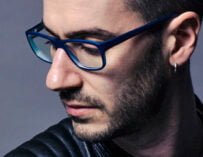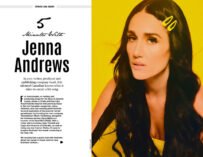
Cass: “50 percent of this industry and this kind of ‘game’ is hustling and then 50 percent is blind chance.” Pic: Daniel A Harris
After working with everyone from Take That to Rudimental, the acclaimed songwriter-producer shares his insight into successful modern pop co-writing
Cass Lowe is a multi-platinum selling British musician and producer with almost two decades of experience, writing for and with the likes of Take That, Jess Glynne, Lily Allen, Alison Moyet, Chance The Rapper, AlunaGeorge, Fifth Harmony, James Arthur, MØ and Gabrielle Aplin. In 2016, he won the Ivor Novello award for Best Contemporary Song with Snakehips for co-writing their Top 10 hit All My Friends and bagged Songwriter Of The Year at the A&R Awards that same year. In 2017, he co-wrote and co-produced Charli XCX’s Boys, and he’s credited on Rudimental’s upcoming 2019 album Toast To Our Differences.
So, on hearing that Cass was lined up to speak at the Ultimate Seminar in London this week, we jumped at the chance to chat with him and get some advice from one of the hottest songwriters in the pop scene right now…
Take us back to the beginning.
“I think I first tried writing songs when I was 12 or 13, I got a little acoustic guitar. I think a huge amount of my writing was as an ‘imitator’ – just me looking at songs and going, ‘Oh I want to be able to do that,’ and then trying my hand at it. Not really knowing what I was doing for a good 10 years, then occasionally stumbling on something and then I was like, ‘That’s not too bad, is it? That’s probably worth putting in someone else’s ears.’”
What took you from there to collaborating with other songwriters and getting cuts? I see from your discography that the Diana Vickers song You’ll Never Get to Heaven was your first release, but I imagine there’s more to the story that got you to that point.
“Yeah, it’s been a kind of long and winding road, in a weird way. I’ve always been one of those people who are completely obsessed with music and songs. When I was a teenager I was a crazy consumer of all different genres and loved acoustic, metal, rap and dance. I think I just fell into it because I left school and there were a few things that I could do, but I wasn’t sure what I was going to do as a job. The only thing that I really loved was music, so I gave myself 12 months as a classic British gap year thing, and went around with a guitar. I could play the guitar and sing a little bit, but I didn’t know what I wanted to be, so I started doing some open mic shows and I got some support slots.”
Where were you at this point?
“I grew up in South London, so I was going around all the standard places. Somewhere along the way I got spotted by a manager and they wanted me to sign a development deal, and suddenly I was doing an ‘artist’ thing. But I wasn’t really cut out for that. I signed a deal with Universal, but it was too nervous and anxious, and too self-loathing a person, to actually do that. And we found out in that process that I didn’t really want to be doing it, so I took a bit of time off.”
How long ago was that?
“This must have been like 2008 to 2009. It was all part of the learning curve really, so I took a bit of time out. I felt a bit deflated for a little bit and then released that music is the thing I want to be doing, so I thought that maybe I could work with other people. So I started co-writing and slaved away for like five years – I was terrible at it and didn’t really know how to interact with people, or how to make a song and build something together. I had so much to learn about production, and melodies and lyrics, but then at some point I became okay at it! It’s not the sexiest of stories, but it’s been a long learning curve, like a lot of music is.”
So what was the breakthrough? When did you see that getting your music cut might be possible?
“It’s probably not even to do with cuts. A lot of it has been about self-belief, in a weird way. Since I’ve had the success, my self-belief has been renewed and I’ve had some flattering and amazing moments, like winning an Ivor Novello – for a song that I wrote with Ollie [Oliver Lee] from Snakehips. The idea of winning that award, the absolute dream of an award to win, was amazing and then to suddenly win it without really aiming for it, with a song that meant so much to me – it’s a very personal song to me and very much my writing, it’s indicative of my thoughts, style, chords and melodies.
“Once I had that little bit of self-belief you feel rejuvenated, and you think, ‘Oh I can do this.’ I think it’s like all those moments earlier than that, like when your teacher or your friend or your girlfriend tells you, ‘That’s really good,’ or playing live and seeing a reaction. It’s all those bits of reassurance that are like a thumbs up to tell you, ‘This is good, you know, you’re not terrible at this!’

Cass Lowe [left] clutching his Ivor Novello award for Best Contemporary Song with Snakehips
Looking again at your discography, you’ve worked with a wide range of co-writers and artists. How do you end up collaborating with these different people?
“I find that 50 percent of this industry and this kind of ‘game’ is hustling and then 50 percent is blind chance and luck, basically. The people I’ve worked with the most are probably Snakehips. I love the idea that when you combine two people in a room you get something that neither of them could have made on their own. And sometimes it’s a battle because one person believes, ‘No, this is how I want to do it,’ and you’re like, ‘Well we’re here in this room together; it’s not about how you want to do it. It’s about how we’re going to do it together.’
“So I love working with new people and there are so many incredible people out there that I want to get the chance to work with. But yeah, I’ve never been one to have a real routine, and I don’t go in for pitching – I like getting in a room with an artist like Jess Glynne and Lily Allen and trying to understand them, or whoever it is, and seeing what I can bring to their table.”
Was it like that earlier in your career as well? Were you put in a room with artists or were you ever just pitching tracks to be placed?
“In the early years, I did a lot with other ‘baby’ writers and producers, and just trying a song or a pitch. We’d give a Little Mix song a go or give a Rihanna song a go and see what comes out of it. I found it, probably, 95 percent fruitless! But you learn as you along, you learn discipline, some tricks and ideas – you learn from the people you work with – and you also learn what’s wrong, what’s bad about what you do.
“So my preferred way to do it is with the artist, with someone who’s got a bit of a vision and a goal that they can bring something to. I don’t really like to sit down and go, ‘Let’s write a Britney song,’ because… I just tend to turn out terrible songs if I do that!”
What else have you learnt about writing pop music?
“I don’t know. I spent a while chasing big artists like Backstreet Boys and Take That, and it’s fine to get solid tunes out of people, but I always thought that was going to be the thing that I was really proud of. Then once it was done, all the stuff that was way more true to me and genuine is actually what resonates – not just that it makes me feel better – it resonates with the listener more. It’s changed how I write and stopped me from second-guessing the audience too much. A lot of people go into pop and they think it’s simple and they look down on it, but to do great music you have to love the music you’re making. You can’t have any cynicism; you have to be obsessed with it.”
Tell us a bit more about your approach. You clearly don’t have a formula you follow each time, but what are looking for in a session to give you the right environment to create?
“The vibe just needs to be okay. I need to be ready to work with whatever the situation is, so I actually try to train myself not to have ideas, tracks or beats beforehand. It’s so important for you to be able to evolve and adapt, and duck and weave, so I don’t want to be reliant on one track. I have a couple of little things floating around in the back of my head, just in case. But also try not to be too nervous, try to be confident and relaxed.
“Also I try to be prepared about the person I’m going to work with. I make sure I’ve done a bit of research so I know who I’m with. Quite often I’ll do a session in the States and they’ll just slam a stranger in, so you then have to spend 45 minutes chatting to them and working out what they do, where they’re from and what they like. That can cause some bruised egos as well because you don’t know who they are! So it’s really important to know what you’re going in for and be open.”
How do you deal with awkward situations like that?
“Erm, well, it’s only happened to me a couple of times. So much of it is about being nimble and sometimes you just have to be able to pull new things out of your arse! Get something on the table and move on. If the idea’s not working, just go, ‘Try this…’ But if you really believe in it, then you can say, ‘No I want to drag this out and see where it goes.’”
Are you always writing with other producers and artists now?
“Most of my life is co-writing; I don’t write very much 100 percent on my own anymore. When I signed to Universal it was all stuff that I wrote on my own. The thing I found with the solo thing was I didn’t know what to write about. When I was sitting on my own going, ‘My life’s kind of fine, I’m living in my dad’s house, my girlfriend’s nice, I haven’t got any problems…’ It took me a long time to start putting myself into character writing, and I love that.”
Interview: Aaron Slater
Cass Lowe is a speaker at the Ultimate Seminar at the University of Westminster in London on Saturday 24 November. Find out more at cre8ingvision.com/events/ultimate-seminar-2018/ and to discover more about him at casslowe.com




































Related Articles